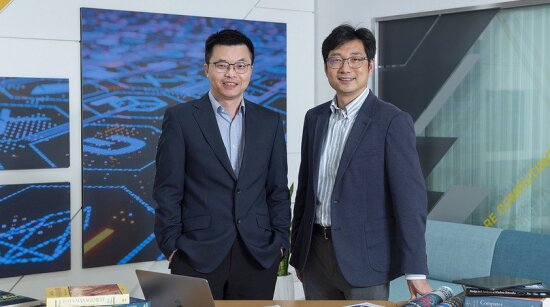
Enhancing secure data sharing and analytics

A secure data and analytics research project led by HKBU has been granted HK$6.7 million by the Collaborative Research Fund (CRF) of the Research Grants Council (RGC) in the 2021-22 exercise.
"This is the first project funded by the CRF on the topic of secure data sharing and analytics. It is a good recognition of our research excellence and leadership in big data and blockchain technology," said Professor Xu Jianliang, Principal Coordinator of the research project and Head of the Department of Computer Science at HKBU.
Titled "User-controlled Secure Data Sharing and Analytics with Blockchain and Trusted Computing Technologies", the project focuses on developing new blockchain and trusted computing technologies to enable user-controlled data sharing, searches, and analytics.
"We are now in the Digital Age. Every day we have a lot of data generated in our work, life and society. Data has become the most valuable resource as oil was in the past," said Professor Xu. "To unlock the value of data, data sharing is the key."
Protecting our data
To achieve secure data sharing, most current systems take the server-centric data-sharing approach, and data is collected into a centralised database in the cloud for secure data storage and sharing.
Many of the essential services we use every day have adopted this method of data storage, and our medical data and other personal data, such as vaccination data, social media data and e-commerce data, are often stored in the cloud. Most mobile apps, with authorized permissions, can access our data; internet browsers such as Chrome caches the websites we've visited, and social media platforms such as Twitter record the comments we've made.
Data sharing has lots of benefits. For instance, sharing medical records with relevant stakeholders can improve the quality of patient care, reduce insurance fraud, and enhance scientific research. However, users are often reluctant to share their data today due to privacy concerns and a lack of incentives, and data sharing needs to comply with privacy laws and regulations. There are also growing cyber security threats, and those cloud systems cannot fully address security and privacy concerns. Cloud security breaches are common even in big companies, and they have affected Apple's iCloud as well as Meta's Instagram and Facebook platforms.
Giving users more control
This research project proposes a brand-new user-centric data-sharing approach that gives back control to users, and according to Professor Xu, it allows data owners to fully manage the sharing and access of their data, so as to eliminate users' privacy concerns, increase their willingness to share data, and break data silos.
"We are leveraging blockchain technology to support decentralised and trusted data storage with no central server needed. The immutability and transparency features of blockchains can also incentivise data sharing," said Professor Xu, adding that the project will also collaborate with the HKBU Clinical Division and industry partners to build a prototype system and conduct a case study on medical health data sharing and analytics.
While the blockchain itself can't ease people's privacy concerns, Professor Xu said that by giving control back to users, it will allow them to control when and how their data is shared. "The blockchain, as a trusted third-party, is used to authorise data access permissions, audit data access requests, and provide users with incentives for data sharing," he added.
Altering data sharing
The new solution will fundamentally change the way we share data today. "Nowadays, data is very valuable, but there are concerns about data privacy. Our research findings from this project can motivate people to share their data safely without privacy concerns," said Professor Xiaowen Chu, Co-Principal Investigator and Professor of the Department of Computer Science at HKBU.
"Also, our marketplaces can further gather a lot of data. Based on the collective data, we can do data analytics and use AI in a better way. Basically, our findings can remove the obstacles of data security and privacy issues. Eventually, it will benefit everyone."
The collaborating institutions involved in this project are HKBU, City University of Hong Kong, The Hong Kong Polytechnic University and the Hong Kong University of Science and Technology.
Previous News
28.02.2022
Next News



